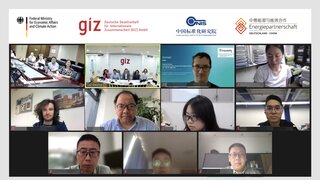Understanding Carbon Footprint and Eco-design Standards in the EU and China
Sino-German Expert Workshop Promotes Exchange on Current Development

On July 12, the Sino-German Energy Partnership, in collaboration with the China National Institute of Standardization (CNIS), organized a workshop to delve into the regulatory landscapes for carbon footprint standards and eco-design in the EU and China. The event aimed to equip stakeholders with knowledge to navigate related complexities while promoting sustainable product development and regulation. Experts from CNIS and Fraunhofer Institute for Systems and Innovation Research ISI shared their insights through keynotes. The attendance of over 113 participants from China and Europe underscores the relevance of the topic.
China and Germany are advancing ambitious decarbonisation goals, emphasising energy efficiency alongside broader eco-design principles. Eco-design encompasses sustainability across a product’s lifecycle, from production to disposal, integrating environmental impacts comprehensively. Offering a holistic view of emissions, the carbon footprint approach is emerging as a critical metric that informs policymaking and business decisions, playing an increasingly important role in eco-design.
Building on discussions from a previous workshop, highlighting the importance of cross-border harmonization of measurements and standards for product energy efficiency, this event enabled knowledge exchange on recent regulatory developments and emerging trends in the EU and China.
Facilitating knowledge exchange on recent regulatory developments and trends
The keynote by Fraunhofer ISI highlighted the new EU’s Eco-design for Sustainable Products Regulation (ESPR), which sets out a framework for how products produced in and imported to the EU can be regulated. It uses a life cycle assessment (LCA) approach where the carbon footprint (CFP) is the key metric used to quantify a product’s impact throughout its lifecycle. All standards within the framework of the ESPR will be mandatory. The so-called Digital Product Passports (DPP) will store the data concerning quantified impacts.
CNIS presented China’s dual carbon standard system, detailing voluntary standards for carbon emission reduction and removal as well as market mechanisms. Covering 24 key industries, responsible for most of national emissions, the system supports the country’s goals of reaching a carbon peak before 2030 and carbon neutrality before 2060. The Chinese government aims to align the standards with international standards such as those by the International Organization for Standardization.
During the panel discussion, both the German and Chinese sides stressed the need for synergic efforts to harmonize data and data infrastructure to enable effective implementation and cross-border compliance. Moving forward, the Sino-German Energy Partnership will continue to facilitate exchanges on standards to promote harmonization. The next workshop on standards exchange will focus on EV charging stations and is scheduled to take place in October, stay tuned!
Sino-German cooperation on energy efficiency standards
The collaboration and harmonisation of standards in energy efficiency between China and Germany are crucial. By aligning their standards through bilateral exchanges, both nations can foster mutual understanding, enhance market transparency, and promote the widespread adoption of energy-efficient technologies and practices. Both BMWK and NDRC thus agreed on deepening the exchanges on energy efficiency standard under the Sino-German Working Group on Energy Efficiency, covering following topics:
- Product energy efficiency
- Energy efficiency standards for sustainable heating solutions
- Benchmarks for energy efficiency and carbon emissions
- Energy efficiency standards for EV charging stations in China and Germany
- Carbon footprint standards in China and the EU Eco-design Directive
- Energy efficiency networks
About the Sino-German Energy Partnership
This event was co-organized by the Deutsche Gesellschaft für Internationale Zusammenarbeit (GIZ) under the framework of the Sino-German Energy Partnership, the official platform for bilateral dialogue and cooperation between China and Germany on energy transition. The German Ministry for Economic Affairs and Climate Action (BMWK) supports the Partnership in corporation with the National Development and Reform Commission (NDRC) and the National Energy Administration (NEA) of China.